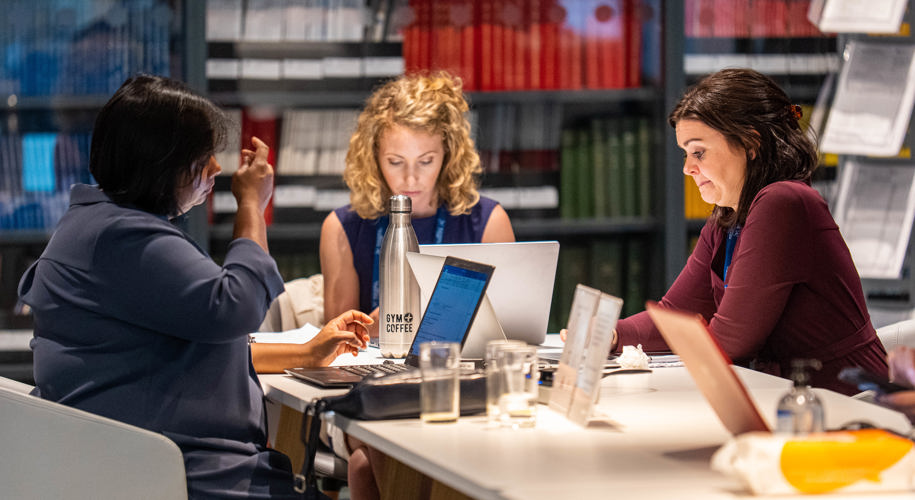Projects to tackle environmental harm and inequity in maternity care
About the challenge
In Summer 2024, the RCOG launched the Green Maternity Challenge, a collaborative project aimed at delivering low-carbon, equitable maternity care. This initiative supports the College’s commitment to helping its members adopt more sustainable practices while addressing health inequalities across the UK.
The Challenge engages multi-professional teams across the UK to develop and implement Sustainable Quality Improvement (SusQI) projects, targeting key areas of environmental harm and inequity in maternity care. With expert mentoring and support from the Centre for Sustainable Healthcare (CSH), these projects are designed to be practical, impactful, and scalable for implementation in practice nationwide.
Green Maternity Conference
The Green Maternity Conference took place in March 2025, showcasing the work of multidisciplinary teams from across the UK. Teams shared the successes and challenges of implementing carbon reduction projects through the Green Maternity Challenge, contributing to a wider conversation on addressing the impact of the climate crisis in women’s health.
We will share a summary of conference outcomes and next steps soon. In the meantime, you can explore the Green Maternity reading list, developed by the RCOG and RCM Library Teams to support the Challenge and Conference. It includes key research, articles and policy papers on sustainability in maternity care.
About the teams and their projects
NHS Orkney: Reducing stress, improving care and cutting carbon emissions
Currently, families need to travel from the Orkney Islands to the Aberdeen Royal Infirmary (ARI) for newborn ultrasound hip dysplasia screening. For many families, this journey is long – with some needing to stay overnight – which has a range of negative impacts. A survey of families found this experience affects childcare, employment and income. In fact, 47% of respondents said their experience has been either moderately or very stressful.
The Orkney team has introduced a local newborn ultrasound screening programme, which not only reduces stress for families but also cuts carbon emissions from air and ferry travel. This initiative offers significant benefits for families and has the potential to improve job satisfaction and foster better working relationships, while also reducing the environmental and financial impacts of travel for the NHS.
West Suffolk Hospital: Rethinking care pathways for multiple pregnancies
In the UK, 1 in 65 pregnancies result in a multiple birth. The multiple pregnancy pathway is often time-consuming and labour-intensive, leading to inefficiencies and dissatisfaction with care. West Suffolk Hospital is rethinking care pathways to enhance patient experiences, reduce unnecessary interventions and lower carbon emissions. The team is exploring several improvements, including:
- Providing more consistent and personalised information, informed by preferences for content and delivery format
- Offering virtual appointments when appropriate to reduce travel and waiting times, aligning with Trust priorities for video consultation
- Reducing repeat blood tests in the first trimester, ensuring testing frequency aligns with NICE guidelines. This may reduce the risk of patients declining later, more valuable tests
- Streamlining duplicate hospital and community team appointments in late pregnancy, also in line with NICE recommendations
Kingston Hospital: Culturally sensitive care for Albanian mothers
A focus group of Albanian women, held at a local community centre, revealed several barriers to accessing care, including fears of being charged for services and negative experiences with some healthcare professionals. Kingston Hospital’s dedicated clinic for Albanian mothers is addressing these challenges, offering culturally sensitive care, better continuity and safer outcomes.
Alongside improved experience throughout the antenatal pathway, the team anticipate outcomes such as reduced triage visits, more births in birthing centres rather than wards and lower rates of emergency c-sections or assisted vaginal births.
Imperial College London: Streamlining referrals and virtual appointments
At Queen Charlotte’s Hospital, 20% of outpatient antenatal appointments take place face-to-face unnecessarily. Imperial College London is improving this by streamlining the referral process and offering virtual appointments. By freeing up in person clinic appointments, other people who do require an appointment may be seen sooner.
These changes enhance convenience, reduce the need for travel and cut waste in antenatal care. Through monitoring appointments more closely, this change may also identify appointments that are not adding value and can be avoided entirely.
Whittington Hospital: Combining virtual and in-person care for greater efficiency
Poorly coordinated antenatal appointments lack continuity and weaken the relationship between care providers and pregnant women and people. During pregnancy, many people attend both midwifery and consultant appointments within the same week, leading to unnecessary duplication and inefficiencies.
The team at Whittington Hospital is combining suitable in-person antenatal midwifery appointments with a virtual obstetrician appointment. This change aims to reduce duplication, improve communication and lower environmental costs.
Great Western Hospital: Supporting breastfeeding through support sessions
Lack of support has been identified as a key reason why many people stop breastfeeding. The team at Great Western Hospital is addressing this by offering daily group support sessions during both the antenatal and postnatal periods. Run by maternity support workers, volunteers and the infant feeding team, these sessions aim to improve breastfeeding outcomes and boost confidence for both parents and babies.
The team is also working on reducing the volume of single-use feed bottles used for babies who require bottle feeding by introducing reusable baby bottles in the unit and encouraging parents to bring in bottles that will continue to be used at home.
Queen Charlotte’s and Chelsea Hospital: Clearer hypertension care pathways
Hypertensive disease in pregnancy affects around 10% of the general population, but Queen Charlotte’s and Chelsea Hospital has a higher estimated postnatal hypertension rate due to the complexity of care provided. The team is working to improve guidance to reduce inconsistencies and streamline care for pregnant people with a diagnosis of hypertension.
Improving hypertension management can streamline care, reduce prolonged hospital stays, supporting better rest and recovery, while boosting patients’ confidence in managing their health. By streamlining hypertension care and offering clearer guidance, the hospital aims to enhance recovery while reducing the environmental impact of care.
Norfolk and Norwich University Hospital: Virtual wards for hyperemesis gravidarum
People experiencing nausea and vomiting in pregnancy (NVP) or hyperemesis gravidarum (HG) often face significant barriers to accessing timely care, leading to stress, physical complications and mental health challenges. Pregnant women frequently report feeling dismissed or that their condition is normalised as part of pregnancy, leaving them unsupported and contributing to avoidable stress.
The team is introducing a virtual ward model aiming to prevent readmissions to optimise care for people with hyperemesis gravidarum. This will allow pregnant women and people to get the care they need at home safely and conveniently, reducing hospital emissions and improving the overall experience.
South Warwickshire: Improving pelvic health through perineal massage
Perineal trauma and prolonged second stage are associated with poor pelvic health in the short term, and anal and urinary incontinence pelvic organ prolapse in the long term. These symptoms can have significant impacts on mental health and lifestyle.
Perineal massage has been shown to reduce rates of perineal tears, the need for continence products and unnecessary follow-up appointments with physiotherapy or gynaecology. The team at South Warwickshire is promoting the uptake of perineal massage by developing training for staff to optimise their knowledge, skills and confidence in providing counselling on perineal massage. This change aims to improve long-term pelvic health outcomes for pregnant women and people and reduce the need for costly treatments.


Explore the Green Maternity reading list
Explore key articles, research and policy resources on sustainability in maternity care, compiled to support the Green Maternity Challenge and Conference.
